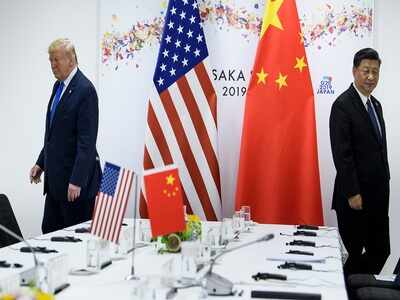
WASHINGTON: What began with ping-pong diplomacy nearly 50 years ago plunged into tit-for-tat hostility this week as China retaliated on Friday to the United States’ closure of the Chinese consulate in Houston by ordering the US consulate in Chengdu to cease operations by Monday.
Meanwhile, US President Donald Trump and his Secretary of State Mike Pompeo both delivered broadsides against Beijing, firmly placing China as the new geo-political danger to the free world, threatening a shaky global economic order at the top of which stands the nearly $ 650 billion US-China trade.
In remarks at his daily (resumed) coronavirus briefings after yet another fiery anti-China tirade from his administration, President Trump said the trade deal with China “means less to me now than it did when I made it,” even though, he suggested, Beijing was trying to buy its way out of the crisis by purchasing more corn and soy bean from American farmers than ever before.
Trump repeatedly blamed China for the coronavirus, lamenting that the US had to turn off its economy “because of what China did,” even as his top foreign policy mandarin delivered a tough new message to Beijing: the US will not sit back in the face of the “China threat” to “our economy, for our liberty, and indeed for the future of free democracies around the world.”
In a policy speech at the Nixon Presidential library that threw out a call for “a new grouping of like-minded nations, a new alliance of democracies,” to take on China, Pompeo said the engagement successive US administrations have been pursuing has not brought the kind of change inside of China that President Nixon had hoped to induce, but had instead created a “Frankenstein” he had once feared.
“The truth is that our policies – and those of other free nations – resurrected China’s failing economy, only to see Beijing bite the international hands that were feeding it,” Pompeo said, apportioning blame to NATO allies and other democratic countries for getting hoodwinked by talk of China’s “peaceful rise” among other things. “For too long we let the Chinese Communist Party set the terms of engagement, but no longer. Free nations must set the tone. We must operate on the same principles,” he proposed, urging freedom-loving nations to work together to induce change in China.
“We cannot repeat the mistakes of these past years. The challenge of China demands exertion, energy from democracies – those in Europe, those in Africa, those in South America, and especially those in the Indo-Pacific region. So we can’t face this challenge alone. The United Nations, NATO, the G7 countries, the G20, our combined economic, diplomatic, and military power is surely enough to meet this challenge if we direct it clearly and with great courage,” he added.
The muscular speech was the fourth such in recent weeks from top Trump principals, marking a rapid downturn in ties with a country that was celebrated till recently as a rising power, before the coronavirus pandemic it is accused of unleashing helped redefine it as a threat to the US and to the world. In an extraordinary charge, Pompeo accused China of ungratefully and calculatedly sending propagandists “into our press conferences, our research centers, our high-schools, our colleges, and even into our PTA meetings,” in return for the US opening its arms to Chinese citizens.
The charge came on the heels of an FBI crackdown on Chinese R&D espionage that resulted in the arrest of three Chinese nationals who the US says were masquerading as students but were connected to the Chinese military. A fourth such “researcher” is said to have sought refuge in the Chinese consulate in San Francisco.
In recent months, the US has zeroed in on the so-called Thousand Talents program, an initiative Beijing originally set up to woo Chinese natives back to China but which was later expanded to attract American scientists too.
The growing anti-Chinese sentiment this has engendered in the US has rattled the nearly four million Americans of Chinese descent and the Chinese-American community, the largest Asian cohort in the US, recalling the demonization and internment of Japanese-Americans during World War Two.
Meanwhile, US President Donald Trump and his Secretary of State Mike Pompeo both delivered broadsides against Beijing, firmly placing China as the new geo-political danger to the free world, threatening a shaky global economic order at the top of which stands the nearly $ 650 billion US-China trade.
In remarks at his daily (resumed) coronavirus briefings after yet another fiery anti-China tirade from his administration, President Trump said the trade deal with China “means less to me now than it did when I made it,” even though, he suggested, Beijing was trying to buy its way out of the crisis by purchasing more corn and soy bean from American farmers than ever before.
Trump repeatedly blamed China for the coronavirus, lamenting that the US had to turn off its economy “because of what China did,” even as his top foreign policy mandarin delivered a tough new message to Beijing: the US will not sit back in the face of the “China threat” to “our economy, for our liberty, and indeed for the future of free democracies around the world.”
In a policy speech at the Nixon Presidential library that threw out a call for “a new grouping of like-minded nations, a new alliance of democracies,” to take on China, Pompeo said the engagement successive US administrations have been pursuing has not brought the kind of change inside of China that President Nixon had hoped to induce, but had instead created a “Frankenstein” he had once feared.
“The truth is that our policies – and those of other free nations – resurrected China’s failing economy, only to see Beijing bite the international hands that were feeding it,” Pompeo said, apportioning blame to NATO allies and other democratic countries for getting hoodwinked by talk of China’s “peaceful rise” among other things. “For too long we let the Chinese Communist Party set the terms of engagement, but no longer. Free nations must set the tone. We must operate on the same principles,” he proposed, urging freedom-loving nations to work together to induce change in China.
“We cannot repeat the mistakes of these past years. The challenge of China demands exertion, energy from democracies – those in Europe, those in Africa, those in South America, and especially those in the Indo-Pacific region. So we can’t face this challenge alone. The United Nations, NATO, the G7 countries, the G20, our combined economic, diplomatic, and military power is surely enough to meet this challenge if we direct it clearly and with great courage,” he added.
The muscular speech was the fourth such in recent weeks from top Trump principals, marking a rapid downturn in ties with a country that was celebrated till recently as a rising power, before the coronavirus pandemic it is accused of unleashing helped redefine it as a threat to the US and to the world. In an extraordinary charge, Pompeo accused China of ungratefully and calculatedly sending propagandists “into our press conferences, our research centers, our high-schools, our colleges, and even into our PTA meetings,” in return for the US opening its arms to Chinese citizens.
The charge came on the heels of an FBI crackdown on Chinese R&D espionage that resulted in the arrest of three Chinese nationals who the US says were masquerading as students but were connected to the Chinese military. A fourth such “researcher” is said to have sought refuge in the Chinese consulate in San Francisco.
In recent months, the US has zeroed in on the so-called Thousand Talents program, an initiative Beijing originally set up to woo Chinese natives back to China but which was later expanded to attract American scientists too.
The growing anti-Chinese sentiment this has engendered in the US has rattled the nearly four million Americans of Chinese descent and the Chinese-American community, the largest Asian cohort in the US, recalling the demonization and internment of Japanese-Americans during World War Two.
Download
The Times of India News App for Latest World News

Coronavirus outbreak
Trending Topics
LATEST VIDEOS
More from TOI
Navbharat Times
Featured Today in Travel
Get the app









